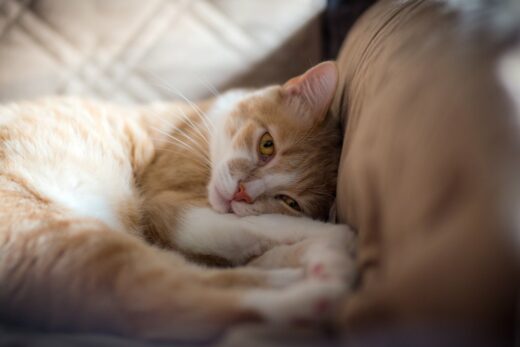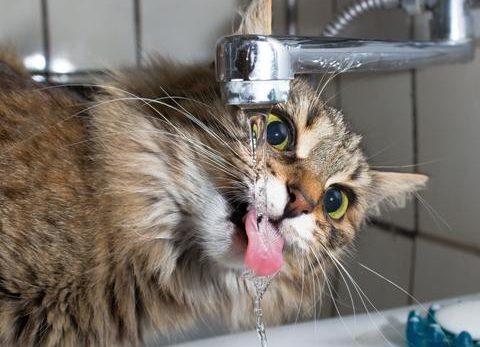Achoo! It’s a cute, high-pitched little squeak, an adorable little “cat moment” that warms the heart of a pet parent when they hear it. But then, another squeak sounds, and another. Eventually, one thought keeps repeating: why is my cat sneezing? Can cats get a cold? A sweet quirk can quickly become a cause of concern when a feline can’t seem to stop snorting, snuffling, and sneezing, but is it really something to worry about?
Cats can get the sniffles, tickles in their nasal cavity, or a sudden sneeze when confronted by dust: they’re much like humans, dogs, and other animals in that aspect. It’s knowing which sneezes are symptoms and which are simply reflexes that’s important. Here’s how to tell the difference between a cat needing a simple “gesundheit!” and an appointment with a feline health care provider.
Cat Sneezing Frequency
The best measure for severity when it comes to a cat sneezing is observing how often it happens, and determining if other symptoms are present. A single sneeze is almost never cause for concern unless it comes with discharge, such as excessive mucus, drool, or blood from the mouth or nose. Just as sneezes are a fact of life for humans, cats sneeze for a variety of benign reasons, such as inhaling irritants like dust, pollen, or strong scents in their nose.
A sneeze, whether human or feline, is a reflex triggered by the body to push unwanted or foreign particles out. This involuntary rush of outgoing air sweeps away irritants, preventing them from further stimulating sensitive tissues and tiny hairs inside the nose. While this reflex is often set off by the surrounding environment, it can also occur due to infections within the body.
As far as how many cat sneezes are considered “normal”, there is no definitive number. However, it takes consistent and ongoing sneezing to signal a real issue. It’s reasonably safe to say that sneezing once a day, or in direct response to a stimuli like a room fragrance spray, is generally safe to ignore.
Environmental Causes For Cat Sneezing
There are a number of everyday products and seemingly harmless habits that could trigger bouts of sneezing in a pet cat. Remember, a cat’s experience with their indoor environment is much different than a human’s; they are much closer to the carpet, for example, which means that carpet shampoo that barely registers to a human nose is front-and-center for a feline sniffer. Below, a few common household products to keep in mind that may be triggering his incessant sneezing:
Laundry Detergent / Softener: Believe it or not, a recent change in laundry detergent or softener can cause allergic reactions in cats, ranging from mild (a few sneezes) to severe (difficulty breathing.) Cats come into close contact with their owner’s clothes and often their bed linens as well, giving their nose plenty of opportunity to twitch at the new scent. Helpful hint: Switch to an unscented detergent and softener and see if it makes a difference.
Cleaning Products: Whether a spray, scrub, or polish is new or used sparingly, a fragranced product can be the culprit behind cat sneezing fits. That’s because these products have a tendency to linger at the perfect cat height: a few inches up from the floor or recently-cleaned surface. Helpful hint: Air out any recently-cleaned rooms thoroughly, and allow pets a scent-free area to retreat to.
Home Fragrance Products: For the sake of feline respiratory health, pet parents are usually advised to avoid home fragrance products that have an aerosol effect, including sprays and oil diffusers. Not only do cats directly breathe these potentially harmful particles in, they also orally ingest what settles on their fur, causing stomach upset and internal issues. Helpful hint: Avoid heavy, cloying home fragrance scents, and do not use aerosolized fragrance methods/products.
Personal Fragrance Products: That new cologne or shampoo may smell nice, but cats have no way to disagree – other than sneezing, of course. Keep new scents to a minimum, and introduce them slowly whenever possible. Always give domestic cats a low or no-scent area to retreat to, just in case they’re feeling overwhelmed by the new fragrance. Helpful hint: Introduce any new scents gradually, and do not use or apply them immediately before handling or hugging a cat.
Dust and Dander: Bringing a new pet or person into the home may also introduce unfamiliar allergens in the form of dust and dander on their hair/fur, clothing, and belongings. If anyone new has come into the home recently, whether they walk on two legs or four, they may be the cause behind a sudden bout of cat sneezing. Helpful hint: Vacuum and dust frequently, bathe pets according to vet recommendations, and wash/wipe down any new belongings coming into the home.






